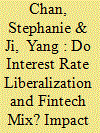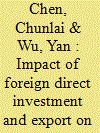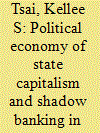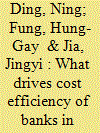|
|
|
Sort Order |
|
|
|
Items / Page
|
|
|
|
|
|
|
| Srl | Item |
| 1 |
ID:
152512


|
|
|
|
|
| Summary/Abstract |
This paper examines and compares the profitability of banks in the USA and China. The USA has the largest market-based banking system and the financial system of China is still bank-based. Our analysis indicates that in terms of profitability, banks in China outperformed those in the USA during our study period (2008–2014). Real estate loans had an adverse effect on US bank profitability during the financial crisis and no effect after the crisis but consistently improved the profitability of Chinese banks. Interest margins have no effect on US bank profitability but a consistently positive effect on Chinese banks, confirming that China is a traditional bank-based economy. Interbank loans have a positive and significant effect on Chinese bank profitability, while interbank domestic loans have a negative effect on US bank profitability. Finally, size had a positive effect on US banks after the financial crisis period, confirming the scale economies of large US banks, but a negative effect on Chinese banks, indicating diseconomies of scale.
|
|
|
|
|
|
|
|
|
|
|
|
|
|
|
|
| 2 |
ID:
171878


|
|
|
|
|
| Summary/Abstract |
In this paper we attempt to characterize the stability of shadow deposits in China with interest rate liberalization and fintech developments. We emphasize that shadow banks provide higher but riskier returns and such characteristics affect the stability of shadow deposits. In our setting, the stability of shadow deposits is influenced by two offsetting effects, namely: the patience effect, which makes investors more willing to wait because of the potentially higher returns; and the uncertainty effect, which makes investors more likely to withdraw as a result of higher risk. Under liberalized interest rates, the patience effect will erode and the uncertainty effect will be heightened because the post‐liberalization higher return of traditional banks undermines the importance of the extra return of shadow deposits to depositors, while preserving the importance of the risk aspect. Fintech development is modeled as a reduction in the withdrawal cost that facilitates runs. This affects the stability of shadow deposits because of their wider fintech reliance. Regulators should be cautious in pushing interest rate liberalization and fintech application alongside building a safety net for shadow banking.
|
|
|
|
|
|
|
|
|
|
|
|
|
|
|
|
| 3 |
ID:
152511


|
|
|
|
|
| Summary/Abstract |
This paper investigates the impact of foreign direct investment (FDI) and exports on urbanization in China. Using prefecture city-level panel data covering China's 262 prefecture cities for the period 2004–2013 and employing a dynamic panel system generalized method of moments model with instrumental variable regression techniques, our study finds that FDI and exports have, on average, played a significantly positive role in China's urbanization. However, the impacts of FDI and exports on urbanization vary across regions. FDI has a positive and significant impact on urbanization in the coastal region but has no impact on urbanization in the inland region. Exports have a positive and significant impact on urbanization in both the coastal and inland regions, but the effect is much larger in the coastal region than in the inland region. The results imply that further attracting FDI inflows and promoting exports will contribute to China's urbanization, especially for the inland region.
|
|
|
|
|
|
|
|
|
|
|
|
|
|
|
|
| 4 |
ID:
138152


|
|
|
|
|
| Summary/Abstract |
The Xi-Li administration faces the dual challenge of managing state capitalism and shadow banking as China enters a phase of more moderate economic growth. During China’s first three decades of reform, private sector development occurred in parallel with prioritization of state-owned enterprises in strategic industries, and growth surged. This pattern of state capitalism rested on an unarticulated bifurcated financing arrangement whereby the formal banking system primarily served public enterprises, while private businesses relied primarily on informal finance. However, China’s response to global financial crisis disrupted the preceding equilibrium of financial dualism under state capitalism. Unprecedented expansion of bank lending after 2008 created opportunities for a host of state economic actors—including SOEs, state banks, and local governments—to expand their participation in off-balance sheet activities.
|
|
|
|
|
|
|
|
|
|
|
|
|
|
|
|
| 5 |
ID:
138106


|
|
|
|
|
| Summary/Abstract |
This study uses stochastic frontier analysis to examine the factors that influenced cost efficiency of banks in China from 2005 to 2013. The results indicate that policy variables, such as the reserve requirement ratio, the interest rate spread and open market operations by the People's Bank of China, are effective in improving the cost efficiency of banks, but shadow banking variables may reduce cost efficiency. Among the various bank types, city commercial banks appear to be the most efficient and foreign banks are the least efficient. The present study suggests that policy-makers can have a positive influence on bank cost efficiency by adjusting macro policy variables on different types of banks and by requiring more information on the shadow banking activities to improve monitoring.
|
|
|
|
|
|
|
|
|
|
|
|
|
|
|
|
|
|
|
|
|